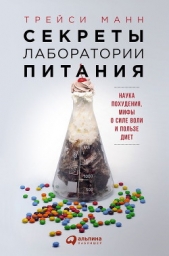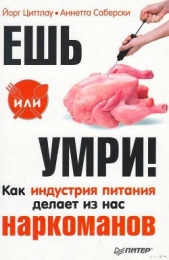Секреты лаборатории питания. Наука похудения, мифы о силе воли и пользе диет

Секреты лаборатории питания. Наука похудения, мифы о силе воли и пользе диет читать книгу онлайн
Вы не считаете свой вес идеальным, выбираете диету пожестче, но толку от этого немного. Вы мучаете себя голодом и держите форму, вот только настроение при этом ни к черту. Весы для вас — самый строгий судья, но все ваши мечты — о чем-то вкусном и запретном. Каждому, кто боролся с лишним весом, знакомы эти проблемы. Как их избежать? Какие ошибки мы допускаем, пытаясь привести себя в форму? Актуальная и провокационная книга профессора Трейси Манн, основателя лаборатории здоровья и питания Миннесотского университета, дает четкие ответ на эти вопросы. Опираясь на современные научные данные и огромный личный опыт, автор объясняет, почему популярные диеты не работают. Манн, посвятившая изучению темы больше 20 лет, утверждает: худеть ради соответствия навязанным шаблонам не просто бессмысленно, а опасно для здоровья. Вес, в котором вам комфортно, в котором вы чувствуете себя здоровым и довольным, — вот идеал, к которому нужно стремиться. Только за него и имеет смысл бороться, и профессор Трейси Манн подскажет, с чего начать и как удержать результат.
Внимание! Книга может содержать контент только для совершеннолетних. Для несовершеннолетних чтение данного контента СТРОГО ЗАПРЕЩЕНО! Если в книге присутствует наличие пропаганды ЛГБТ и другого, запрещенного контента - просьба написать на почту [email protected] для удаления материала
39. Tinuke Oluyomi Daniel, Christina M. Stanton, and Leonard H. Epstein, “The Future Is Now: Reducing Impulsivity and Energy Intake Using Episodic Future Thinking”, Psychological Science 24, no. 11 (November 1, 2013): 2339—42, doi:10.1177/0956797613488780.
40. K. Fujita and J. J. Carnevale, “Transcending Temptation Through Abstraction: The Role of Construal Level in Self-Control”, Current Directions in Psychological Science 21, no. 4 (July 25, 2012): 248-52, doi: 10.1177/0963721412449169.
41. Wansink, van Ittersum, and Painter, “How Descriptive Food Names Bias Sensory Perceptions in Restaurants”.
42. Walter Mischel and Nancy Baker, “Cognitive Appraisals and Transformations in Delay Behavior”, Journal of Personality and Social Psychology 31, no. 2 (1975): 254.
43. Помните, я сказала, что всего один из 300 социальных психологов, прибывших на конференцию, догадался, что мы проводим эксперимент (с яблоками)? Это был Кен Фудзита. Ничего от него не утаишь.
44. Kentaro Fujita and Н. Anna Han, “Moving Beyond Deliberative Control of Impulses: The Effect of Construal Levels on Evaluative Associations in Self-Control Conflicts”, Psychological Science 20, no. 7 (July 1, 2009): 799-804, doi:10.1111/j.l467-9280.2009.02372.x; Kentaro Fujita, “Seeing the Forest Beyond the Trees: A Construal-Level Approach to Self-Control”, Social and Personality Psychology Compass 2, no. 3 (May 2008): 1475-96, doi:10.1111/j.l751-9004.2008.00118.x.
45. Fujita and Han, “Moving Beyond Deliberative Control of Impulses”.
1. Jon Henley, “Merde Most Foul”, Guardian, April 12, 2002, http:// www.theguardian.com/world/2002/apr/12/worlddispatch.jonhenley.
2. Suzanne Daley, “Budget Cuts May Foul Sidewalks of Paris”, New York Times, November 6, 2001, http://www.nytimes.com/2001/ll/06/ world/budget-cuts-may-foul-sidewalks-of-paris.html.
3. D. Neal, W. Wood, and J. Quinn, “Habits — A Repeat Performance”, Current Directions in Psychological Science 15, no. 4 (2006): 198-202; Judith A. Ouellette and Wendy Wood, “Habit and Intention in Everyday Life: The Multiple Processes by Which Past Behavior Predicts Future Behavior”, Psychological Bulletin 124, no. 1 (1998): 54-74, doi: 10.1037//0033-2909.124.1.54; Wendy Wood and David T. Neal, “A New Look at Habits and the Habit-Goal Interface”, Psychological Review 114, no. 4 (October 2007): 843-63, doi:10.1037/0033-295X.114.4.843.
4. Я значительно упрощаю информацию, полученную из большого объема исследовательской литературы, посвященной сравнению автоматического и контролируемого поведения. Интересный обзор можно найти в работе: J. A. Bargh and М. J. Ferguson, “Beyond Behaviorism: On the Automaticity of Higher Mental Processes”, Psychological Bulletin 126, no. 6 (November 2000): 925-45.
5. Joanna Robertson, “The Pampered Pooches of Paris”, BBC, 2011, http://www.bbc.co.uk/news/magazine-16268890.
6. В этой обстоятельной статье описываются десятки исследований, доказавших, что наши намерения редко совпадают с реальным поведением: Thomas L. Webb and Paschal Sheeran, “Does Changing Behavioral Intentions Engender Behavior Change? A Meta-Analysis of the Experimental Evidence”, Psychological Bulletin 132, no. 2 (March 2006) : 249-68, doi:10.1037/0033-2909.132.2.249.
7. Phillippa Lally et al., “How Are Habits Formed: Modelling Habit Formation in the Real World”, European Journal of Social Psychology 40, no. 6 (October 16, 2010): 998-1009, doi:10.1002/ejsp.674.
8. Heather Barry Kappes and Gabriele Oettingen, “Positive Fantasies about Idealized Futures Sap Energy”, Journal of Experimental Social Psychology 47, no. 4 (July 2011): 719-29, doi:10.1016/j.jesp.2011.02.003.
9. Если сравнивать с теми, кому удалось визуализировать достигнутое. Shelley Е. Taylor et al., “Harnessing the Imagination: Mental Simulation, Self-Regulation, and Coping”, American Psychologist 53, no. 4 (1998): 429-39.
10. Доказательство того, что существующая модель поведения может стать основой для новых привычек, см. в работе: Stef Р. J. Kremers, Klazine van der Horst, and Johannes Brug, “Adolescent Screen-Viewing Behaviour Is Associated with Consumption of Sugar-Sweetened Beverages: The Role of Habit Strength and Perceived Parental Norms”, Appetite 48, no. 3 (May 2007): 345-50, doi:10.1016/j. appet.2006.10.002; Judith A Ouellette and Wendy Wood, “Habit and Intention in Everyday Life: The Multiple Processes by Which Past Behavior Predicts Future Behavior”, Psychological Bulletin 124, no. 1 (1998): 54-74; Glenn J. Wagner and Gery W. Ryan, “Relationship between Routinization of Daily Behaviors and Medication Adherence in HIV-Positive Drug Users”, AIDS Patient Care and STDs 18, no. 7 (July 2004): 385-93, doi: 10.1089/1087291041518238.
11. M. Ji and W. Wood, “Purchase and Consumption Habits: Not Necessarily What You Intend”, Journal of Consumer Psychology 17, no. 4 (October 2007) : 261-76, doi:10.1016/S1057-7408(07)70037-2.
12. В связи с выработкой привычки делать физические упражнения об этом упоминается в работе: Wendy Wood, Leona Tam, and Melissa Guerrero Witt, “Changing Circumstances, Disrupting Habits”, Journal of Personality and Social Psychology 88, no. 6 (2005): 918-33. В работе рассказывается, как та же идея способствует появлению привычки выбирать экологичные способы перемещения: Bas Verplanken et al., “Context Change and Travel Mode Choice: Combining the Habit Discontinuity and Self-Activation Hypotheses”, Journal of Environmental Psychology 28, no. 2 (June 2008): 121-27, doi:10.1016/j.jenvp.2007.10.005. До конца не выяснено, действует ли этот принцип в сфере питания, согласно работе: Johannes Brug et al., “Environmental Determinants of Healthy Eating: In Need of Theory and Evidence”, Proceedings of the Nutrition Society 67, no. 3 (August 1, 2008): 307-16, doi: 10.1017/S0029665108008616.
13. Jayne Hurley and Bonnie Liebman, “Big: Movie Theaters Fill Buckets... and Bellies”, Nutrition Action Health Letter, December 2009.
14. David T. Neal et al., “The Pull of the Past: When Do Habits Persist Despite Conflict with Motives?”, Personality & Social Psychology Bulletin 37, no. 11 (November 1, 2011): 1428-37, doi:10.1177/0146167211419863.
15. He рекомендую этого делать — в кинотеатрах не оценят.
16. Bas Verplanken and Wendy Wood, “Interventions to Break and Create Consumer Habits”, Journal of Public Policy & Marketing 25, no. 1 (2006): 90-103.
17. Wood, Tam, and Witt, “Changing Circumstances, Disrupting Habits”.
18. He то чтобы я призывала вас в отпуске питаться исключительно полезно. Скорее, это можно объяснить тем, что сейчас я нахожусь в Париже, где позволяю себе гораздо больше пирожных, чем обычно.
19. Peter М. Gollwitzer, “Implementation Intentions: Strong Effects of Simple Plans”, American Psychologist 54, no. 7 (1999): 493-503.
20. Доказательства см. в обзорной статье: Peter М. Gollwitzer and Paschal Sheeran, “Implementation Intentions and Goal Achievement: A Meta-Analysis of Effects and Processes”, Advances in Experimental Social Psychology 38 (2006): 69-119, doi: 10.1016/S0065-2601 (06)38002-1. Хорошие примеры можно найти в работе: Peter М. Gollwitzer and Veronika Brandstätter, “Implementation Intentions and Effective Goal Pursuit”, Journal of Personality and Social Psychology 73, no. 1 (1997): 186-99.
21. Marieke A. Adriaanse et al., “Do Implementation Intentions Help to Eat a Healthy Diet? A Systematic Review and Meta-Analysis of the Empirical Evidence”, Appetite 56, no. 1 (February 2011): 183-93, doi:10.1016/j. appet.2010.10.012.
























